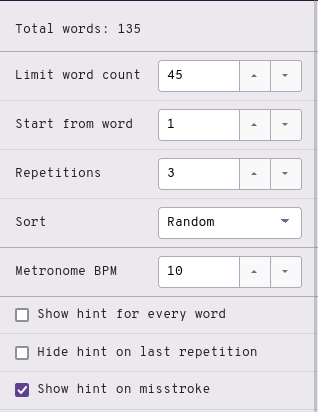Chapter 6: Left hand consonants continued
Useful links
- Single syllable fqm words drill
- Single syllable gny words drill
- Single syllable zvj words drill
- Chapter 6 test
Left hand f, q, and m
TPis “f” as in “fad”
KWis “q” as in “quit”
PHis “m” as in “mod”
Examples
- far
TPAR - flat
TPHRAT - quill
KWEUL - quip
KWEUP - met
PHET - more
PHOR
Wouldn’t PH as “f” make more sense?
Why not use PH for “f”? After all, this would be easier to remember since “ph” has the same sound as “f”. However, it would be impossible to chord “fl” sounds as the PH and HR chords overlap. PHR already represents the initial “pl” consonants. We would run into ambiguity if we also defined PHR to be the “fl” consonants (e.g., “plat” and “flat”).
Mnemonics
Feel free to come up with your own or even suggest some!
- Each of these chords are simply two keys in a row
TPis the top row pressed by the ring and middle fingersKWis the bottom row pressed by the ring and middle fingersPHis the top row pressed by the middle and index fingers
- Think “FQM” in steno order (top to bottom, left to right!)
- fully qualified mountain
- first quill made
Section practice
Left hand g, n, and y
TKPWis “g” as in “get”
NOTE:
TKPWis only used for the “hard g” sound. For example, the word “gel” would not useTKPWas the initial consonant is a “soft g” (a “j” sound).
TPHis “n” as in “not”
KWHis “y” as in “yet”
KWH is only used when the word starts with the letter “y”; if a word has a “y” sound but doesn’t start with a “y”, simply don’t use a left hand consonant chord.
Examples
- gloss
TKPWHROS - gull
TKPWUL - nap
TPHAP - net
TPHET - yet
KWHET - yes
KWHES - use
AOUS
Mnemonics
Feel free to come up with your own or even suggest some!
- Grapes nourish you
TKPWis a group of 4 keys pressed by the ring and middle fingersTPHis a row of 3 keys pressed by the ring, middle, and index fingersKWHis three keys in a rising shape, like the intonation when asking “why?”
Section practice
The initial “y” consonant was recently changed. Check chapter 5 for instructions to update your dictionary if you have a different outline for “y” words.
Left hand z, v, and j
STKPWis “z” as in “zit”
SRis “v” as in “vat”
SKWRis “j” as in “job”
Mnemonics
Feel free to come up with your own or even suggest some!
- Zits are ’sgusting!
- The chemical element strontium (symbol Sr) is not vanadium
SKWRis just the bottom row of the left hand
Examples
- zap
STKPWAP - zip
STKPWEUP - var
SRAR - ver
SRER - jib
SKWREUB - jot
SKWROT
Section practice
The initial “z” consonant was recently changed. Check chapter 5 for instructions to update your dictionary if you have a different outline for “z” words.
Chapter 6 test
This chapter’s test consists of all the practice drills in this chapter. Make sure your settings are configured as such:

- Limit word count: 45
- Start from word: 1
- Repetitions: 3
- Sort: random
- Show hint for every word: unchecked
- Hide hint on last repetition: unchecked
- Show hint on misstroke: checked
Click here to access the chapter 6 test
Recommended completion goal
This is only a suggestion if you are unsure of when to move on to the next chapter; it is not a strict requirement!
Aim for 10–20 WPM with 90% accuracy.
You may use the test material as practice!
Chapter briefs
This section is completely optional, but recommended. If you prefer to learn these all at once, they will be covered in chapter 16.
| Word | Brief | Explanation |
|---|---|---|
| again | TKPWEPB | Drops the first vowel |
| and | SKP | Completely arbitrary, but useful in phrases |
| ask | SK | Drops the first vowel |
| before | PW-FR | Drops all vowels |
| have | SR | have |
| it | T | it |
| no | TPHO | Matches the spelling |
| said | SED | Completely phonetic |
| very | SRE | very |
NOTE: remember that these are briefs; the explanations are not applicable to any arbitrary word.
Practice sentences
- I ask the mod again and again.
- before you said you quit.
- is it fit?
- yes I got it.
- no it is very well.
Answers
EU/SK/-T/PHOD/TKPWEPB/SKP/TKPWEPB/TP-PLPW-FR/U/SED/U/KWEUT/TP-PLS/T/TPEUT/KW-PLKWHES/EU/TKPWOT/T/TP-PLTPHO/T/S/SRE/WEL/TP-PL
Extra briefs
| Brief | Outline | Explanation |
|---|---|---|
| and you | SKPU | SKP + U |
| and I | SKPEU | SKP + EU |
| and the | SKP-T | SKP + -T |
| have you | SRU | SR + U |
| is it | ST | S + T |
| it is | T-S | T + -S (for “is”) |